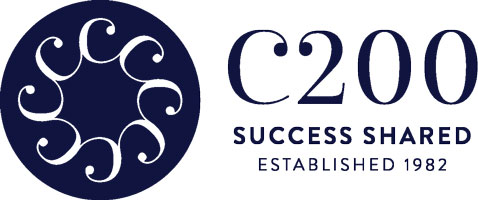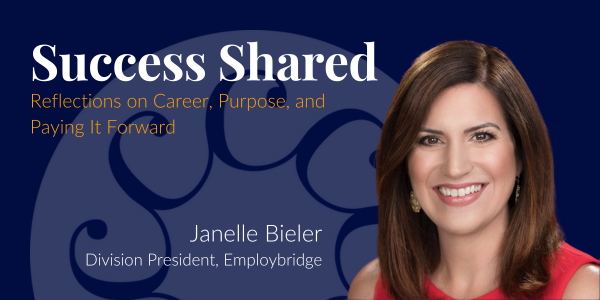
by Eva Glassman | Dec 1, 2023 | Blog, Featured
By Janelle Bieler, Division President, Employbridge | C200 member since 2023
“Purpose.” It’s a word that has become part of the corporate jargon in the past few years. “What is your purpose?” “Do you find purpose at work?”
“Purpose” has always been top of mind throughout my professional journey. At the end of the day when all the tasks are completed, at the end of the year or a strategic goal, what’s that bigger thing you are working toward? What’s the thread through all your professional endeavors?
Developing others and paying it forward have always been deep in my own sense of purpose. I believe in the power of “women empowering women” and try to be a leader who takes concrete steps to mentor, guide, and pull women up alongside me—women both within and outside my organization. This purpose of mine comes from looking back on my own career progression, which I firmly believe is a direct result of women who have taken the time to invest in me. It’s why I found my way into leadership at a young age, it’s driven my career decisions—and it’s what ultimately led me to C200.
The story of how C200 has impacted my professional life embodies C200’s mission to advance women in business, and it’s also a testament to the supportive and intimate ethos that exists among the C200 women. Even before joining C200, I’ve admired these women; they’re warm, welcoming, and always willing to share advice. Joining C200 has been an amazing opportunity to meet a sisterhood of exceptional women on a deeper, different, and more intimate level; it’s an experience you can’t get from just following someone on LinkedIn and admiring from afar. To meet these amazing women and feel their purpose and connection, all you have to do is reach out. The direct impact C200 has had on women in business, and on myself, is priceless.
I’m fortunate to have had different female mentors at various stages of my career. In particular, six years ago was a pivotal time in connecting with some significant mentors who also happened to be members of C200. At that time, I had sought out Joyce Russell, the top-ranking female leader in my work world. I admired not only her impact on the business, but also her exposure in our industry as a thought leader and dedication to advancing women. She was the epitome of what I aspired to be in my career, and although I didn’t know her that well, I went out on a limb, swallowed my imposter syndrome, and asked her advice.
That conversation—the simple act of asking someone for help—changed everything for me. Joyce pulled me into internal and external opportunities and introduced me to people who helped round out my skills and exposure. I grew immensely from those connections and learned the benefit of having a broad group of advisors outside of your company who can offer different perspectives.
That conversation with Joyce started this invisible thread weaving through my career journey that connected me to Larraine Segil, Linda Lore, and Corinne Ripoche—all C200 women (current and former) who made huge impacts on my career.
The thread continued from Joyce to an introduction to Larraine, who sponsored me to join the Exceptional Women Alliance (EWA), a women’s mentorship collaborative that she started. It was at EWA where I was introduced to formal mentorship and paired with the incredible Linda Lore. Linda’s mentorship and coaching has been instrumental in both my personal and professional successes over the past six years. She helped me navigate multiple new work opportunities, pushed me to sharpen my skills, and taught me how to be an effective mentor and coach to others. Through her coaching and development, I became a more effective leader and gained the confidence to start pulling other women up alongside me.
That confidence was recognized by another woman in my internal organization, Corinne Ripoche, who has been one of the most influential women leaders in my career. I reported directly to Corinne for the past couple of years, and when I think back to the leaders who’ve challenged me the most, she’s one of them. She pushed me out of my comfort zone by challenging me to think boldly and disrupt the norms. She left a lasting impression on my leadership style, teaching me how to truly transform business and make an impact on those around me.
Advancing female business leaders is at the core of C200’s values; it’s the reason I was so drawn to their mission and purpose. I look back at, admire, and give gratitude to the community of women throughout my career who genuinely took an interest in my development; like I am today, they too were driven to help others reach the top of the mountain. These women lifted me up by speaking my name in a room full of opportunities and helped me navigate the corporate world. They taught me how to be intentional about my career and that career ladders shouldn’t only move up; instead, career ladders can and should work both ways. As women leaders, whilst we should be focused on moving up ourselves, we also have a responsibility to reach back and ensure we are pulling people up along with us. Every day, I make sure that I lead with purpose and intent, to be available as a mentor for those who ask—someone who walks that talk as a female corporate leader.
Although my invisible thread to C200 began with me asking Joyce Russell for advice six years ago, it doesn’t end now that I’m a member. My mentorship experience throughout my career, particularly from women in the C200 community, taught me how to create those same invisible threads for other women, to extend mine to more rising businesswomen and bring them up the mountain, as women like Joyce, Larraine, Linda, and Corinne did for me. As a member of C200—a collective of top businesswomen who pay it forward—I feel even more empowered in that purpose today.

by Eva Glassman | Nov 29, 2023 | Blog, Featured
By Inna Kuznetsova, CEO, ToolsGroup | C200 member since 2020
Inna Kuznetsova is a frequent speaker on technology-driven innovation. As CEO of ToolsGroup, she is focused on AI-powered solutions that help companies make better, faster supply chain decisions for powerful financial results.
In her recent Forbes article, Inna explains how Generative AI adapts to diverse business needs, making it an indispensable tool for leaders across industries. From optimizing workflows to personalized insights, Generative AI is reshaping how leaders utilize this technology for a competitive edge, amplifying organizational and personal effectiveness.
You can read the full article here.
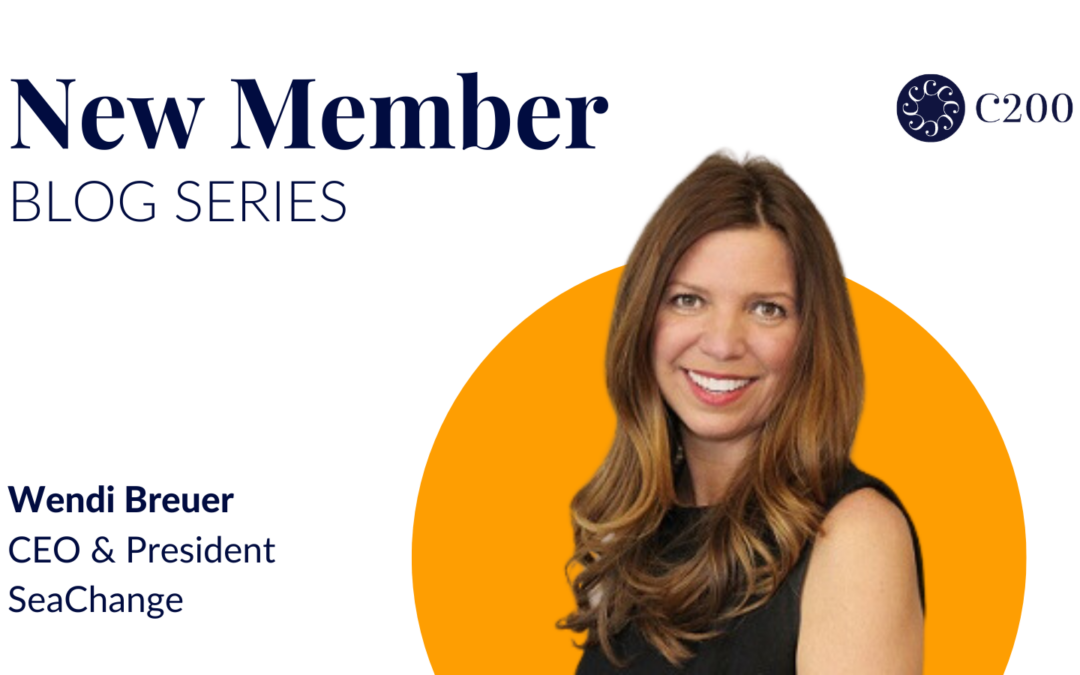
by Eva Glassman | Nov 20, 2023 | Blog, Featured
Wendi Breuer is the CEO and President of SeaChange, a Minneapolis-based print and digital communications company. Since launching in March 2014, SeaChange has found new ways to transform client’s print, structural design, packaging, kitting, mailing, fulfillment, and digital media needs by offering refreshing solutions. Creating an inclusive culture at SeaChange is a big priority for Wendi; she takes pride in her Women’s Business Enterprise National Council (WBENC)-certified business and her women-majority leadership and sales teams. Outside of work, Wendi loves to golf with her husband and two teenage sons. Wendi has been a C200 member since July 2023.
Eva Glassman: Could you please introduce yourself and describe what you do?
Wendi Breuer: I am the CEO and President of SeaChange, a printing and digital communications company located in Minneapolis, Minnesota. We produce direct mail for healthcare organizations, packaging for consumer goods products, and vote-by-mail and in-person ballots for counties across 20 different states. We also have an internal agency called GATHER that produces digital communications like e-mail and text messaging campaigns, interactive games, microsites, and data analytics for our clients.
I launched the company in 2014 and will be celebrating our 10-year anniversary next March. Since our launch, we’ve grown to over 154 employees and with $45 million in revenue. Our printing and agency operations, as well as our warehouse, are in Minneapolis. We also have an office in St. Cloud, Minnesota where our election services team is located.
I started the company with a tagline, which we still use today: “Embracing technology. Redefining print.” I saw an opportunity to create a new organization in the print industry that brings contemporary solutions to modern-day customers. I always joke with my team that if Domino’s Pizza can tell you that your pizza is in the oven, or if Uber can show you exactly where your driver is located, then there’s no reason why we can’t bring solutions like that for our clients!
Our tagline for GATHER is: “We give marketers time for lunch.” What that means is we are driven by putting cutting-edge tools at our clients’ fingertips, allowing them to work more efficiently and giving them time for more strategic initiatives. And of course, time for lunch.
We’ve grown to be the largest women-owned, women-led, WBENC-certified printing company in the country. I’m very proud to lead a certified women-owned business and to be a woman business owner. It’s incredibly rare, especially in our industry. Being a diverse supplier, we believe that diversity and inclusion brings more creativity through our different perspectives coming together. That’s very important to us.
We’re also HITRUST certified, which means that we have an outside firm audit us to ensure we’re managing and producing data securely. We are one of few companies in our industry to have this certification.
EG: Tell me more about being WBENC-certified! That’s a great accomplishment and it clearly means a lot to you. How does being a woman in business impact your thinking and your work?
WB: I’m incredibly proud to be a woman-owned business in an industry where there haven’t traditionally been opportunities for women. I’ve been intentional about bringing women on board with me and giving them opportunities for professional development. So much so that 50% of our leadership team is female and our sales team is 80% female. Throughout production and our warehouses, we’ve got women driving forklifts and running presses! In all aspects of our organization, we give women the opportunity to rise up and grow in their professional journey.
It’s also important for me to give back to the community supporting women business owners. I’ve been a Board member of the National Association of Women Business Owners (NAWBO) for five years; SeaChange is a silver sponsor for them. I was co-creator of the Catalyst fund, which is now the largest sponsor of NAWBO MN. The Catalyst fund was developed as a way for NAWBO members to pay it forward to those who are earlier in their business ownership journey and support them through mentorship.
EG: Giving back to female entrepreneurs in the early stages of their career journeys is clearly very important to you! That makes me curious about your own career journey, when you yourself were in those early stages. How did you start out and get to where you are now, and what do you believe are the biggest factors that led to your current success?
WB: I started my career in a training program for a boutique printing company. I was in sales for 19 years and knew I wanted to be in leadership, so in 2010, I took a new role as VP of Sales at a larger printing company. When we were in discussions of naming me President, I crossed paths with an investor looking for a partner to launch a new printing company. I saw a chance to truly disrupt this age-old industry with my contemporary approach, so I took the leap in 2014, leaving the chance to be President at a larger printing company to start a new company, which is SeaChange! I didn’t realize it at the time, but looking back, I’ve realized taking this chance took a lot of grit and perseverance.
My first mission with SeaChange was to establish a brand and niche. The word SeaChange means transformation or profound change, so we played off that and incorporated redefining print into our tagline. This has become our mantra; SeaChangers (as we like to call ourselves) wake up every day thinking about how we can disrupt the marketplace and bring modern solutions to what has been an antiquated industry. The technology piece was key; we aren’t just a printing company, which sets us apart. Clients come to tour and see us more as an agency, where printing is one of the many things we do.
But the problem at the time was that I didn’t have the talent to carry out my vision. So, my second mission was finding the right talent to join our team, bringing the technological advances, and creating our culture. Today, I’m in awe of the talent on board at SeaChange and how passionate they are to be here. Recruiting is now pretty easy for us as people want to be a part of an industry disruptor, to provide unique solutions that speak to the current issues of our day, and to be a part of our innovative and fun culture.
My entrepreneurial journey involved taking a lot of risks along the way, and one of those risks has been investing in equipment. Over the past several years, we’ve invested over $20 million in new equipment, IT infrastructure to improvements to our space, like HVAC systems, solar panels on our roof, and LED lighting. We renovated the design and architecture of our building, and people who visit tell us we look like an agency and less like a manufacturing site—which was exactly our intent with the renovation. Our customers partner with us because of the technology we offer; they know that printing is just one of many things we provide for them.
EG: The relevance of print in our increasingly digital culture is a topic that has always fascinated me, and it’s so interesting to hear about this issue from your perspective as a business owner in the industry. You were able to identify that issue early on and approach your business in a way that evolves print into the digital age without helping to render it obsolete.
WB: When you combine print and tech solutions together, the opportunity to capture your audience’s attention and increase your response rate rises many times over. We run campaigns for large companies and create communication cadences that tie in emails, texts, landing pages, and interactive games. Through increased engagement, the response rate, membership, or revenue grows.
A print or email campaign on its own won’t maximize responses. Although digital communications are important, we’ve found that people spend time with their direct mail, especially if it’s personalized and targeted. It’s a good way to build trust; someone may look at their email or a website after they’ve seen direct mail communications. Our team has a lot of fun designing print communications like pop-ups and more interactive direct mail. We can print different textures like suede, raised UV, and even glitter! These creative details get people to spend more time with print communications. While printing has declined, direct mail is on the rise again; commercial mail is an $10 billion industry in the US and $80 billion globally.
Another service we offer is online storefronts, so organizations with a dealer network or sales team can order their materials online to be produced on-demand. Instead of speculating on quantities and over-printing, often creating obsolete inventory items, we print as they need them, reducing waste and cost. Again, it’s about doing things to fit modern day needs and allows marketers to plan more efficiently.
EG: I know you said that women in the printing industry at the time you emerged were pretty rare, but were there any women in your professional life who were mentors to you as you went up your career ladder? If not, who are the women who inspire you and why?
WB: The biggest inspiration would be my mother! [laughs] She was always so positive and shaped who I am. The culture I’ve created at SeaChange has a lot to do with watching how she treats everyone, with respect and positivity.
Professionally, my first manager was a woman who took the time and had the patience to train and develop me during the early years of my career. She made an investment in me, which I am very grateful for—her name is Nancy Bjornson.
I was told early in my career that I had a natural ability for leadership. However, that same company brought in a new VP of Sales twice, and both times I was looked over as they hired a man. That’s when I finally thought, “It’s time for me to find my own opportunity for leadership.” So, after 19 years, I moved to another organization and became VP of Sales there.
When I launched SeaChange, my biggest mentors were through NAWBO and being a part of the Women’s Business Development Council (WBDC). Surrounding myself with women who were on the same journey as me was key; they were always there to listen, support me, inspire, and refer business to one another. Those women were instrumental as I was starting SeaChange.
EG: Being looked over twice as VP of Sales is such an interesting story, because I feel as though you can look at that situation two ways. When that happens, you can think, “Oh, I must truly not be good enough if they’re not hiring me,” or you can do what you did, which is say, “I know I’m good enough for this position, so I’m going to work somewhere that will hire me.” It’s so easy to doubt yourself in moments of rejection, especially as a woman in business, so I appreciate your perspective on that moment.
WB: My biggest regret is that I didn’t do it sooner! If I’m to offer any advice, it would be to pave your own path—don’t wait for someone to give you the opportunity.
EG: The perfect segway into my next question! What is your advice to aspiring female entrepreneurs and corporate leaders as they rise up in their own careers?
WB: My Chief Technology Officer jokes with me, “I can’t believe you were audacious enough to have the tagline ‘Embracing Technology. Redefining Print’ in 2014 when you clearly weren’t able to do it at the time.” To look back at our initial vision and think of all that we’re achieving now—creative services, copywriting, programming, data analytics, personalized print campaigns—it is incredibly rewarding.
It is fulfilling to be an entrepreneur, have a vision for the future, and create an organization that cultivates that vision and develops a culture that people want to be a part of. Bringing talent together to make something truly unique in the market, and realizing that vision can be accomplished, is what inspires me every day.
To anyone who has that spark, that vision: I would encourage you to take that opportunity and surround yourself with supportive groups where you can be vulnerable. It’s important to have those trusted advisors who you can go to with your questions, doubts, and fears so they can guide and empower you to have the confidence to reach further. There are going to be obstacles, of course, but often others have been through something similar and can share what they’ve done. For me, being a part of entrepreneurial groups, and now joining C200, gives me the sounding board we all need as trailblazing women in business. Whether I’m at a difficult crossroads in my business or in need of a solution, I need a group I can count on. I probably would have made the entrepreneurial leap sooner if I had a group like C200 in my corner earlier in my career.
EG: Outside of work, what do you do for fun?
WB: I’m a mother of two boys, a 17-year-old and a 15-year-old. I love sharing time with them and cheering on all they do. I’m a hockey mom, a golf mom, a golfer myself —we love to golf as a family, and I enjoy competing in tournaments. We also love to travel, cook with my husband, and socialize with friends. I have a passion for reading business and leadership books; I have a bad habit of buying many and never quite making it through all of them!
EG: What are you most excited about as a new C200 member?
WB: The network, obviously! I’m so excited to get to know more people. C200 is a great opportunity to increase my network beyond Minneapolis and meet women business owners on a national and international scope. It kind of goes back to my love for leadership lessons; the opportunity to continue my professional development and learn from others is so exciting to me. I’m especially looking forward to attending C200’s Signature Events and those hosted in Minneapolis as well. I always want to be learning and growing as a leader, and C200 has so many resources that I can’t want to tap into.
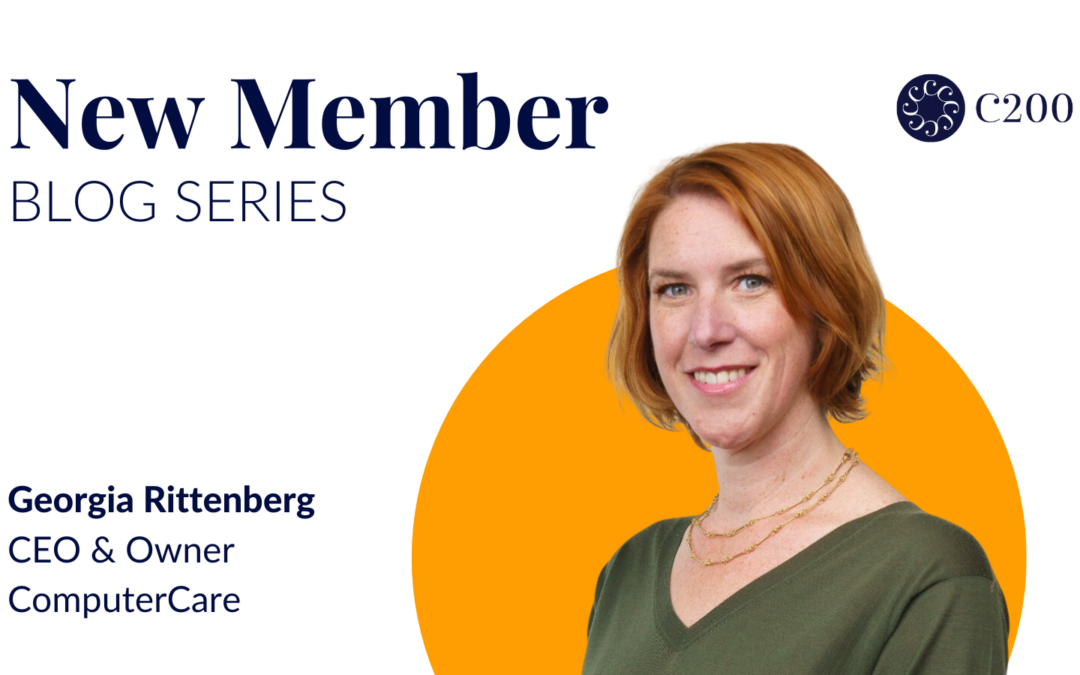
by Eva Glassman | Nov 7, 2023 | Blog, Featured
Georgia Rittenberg is CEO and owner of ComputerCare, an IT service provider, and certified Women’s Business Enterprise National Council (WBENC) Woman Owned Business that specializes in unconventionally thoughtful repair and logistic services specifically tailored to unique needs of each organization. With a background in Community Studies and women’s health, Georgia took an extremely unconventional path that landed her at ComputerCare, first as a part-time customer service representative. Georgia loves to travel, spend time with her community, and complete 1000-piece puzzles every week. She lives in California with her husband, Alan (the previous owner of ComputerCare), and daughter, Penny. Georgia has been a C200 member since July 2023.
Eva Glassman: Can you please introduce yourself and describe what you do?
Georgia Rittenberg: I’m the CEO and owner of ComputerCare. We’re an IT hardware services provider, so we do repair and IT logistics, which consists of warehousing, onboarding, and offboarding on a global scale. We’re based in the US, Ireland, Singapore, and India.
The company was founded in 2004; I joined in 2012 as a part-time customer service rep. One of my favorite stories about my experience with the company is that my now-husband, Alan, was the head of ComputerCare when I had first applied, and he conducted my interview (he was not my husband at the time). He asked me where I saw myself in five years, to which my reply was, “Not working here!” [laughs] At the time, I was going back to school to get my master’s degree in public health—my background is in women’s healthcare policy. Almost five years later, my husband stepped down and I took over running the company… so the exact opposite of what I had told him in my interview!
The privilege of running a privately held company is the major impact you can make as an employer in communities. That’s what drives me day after day: to grow the company, to know that the more people we hire, the more global reach we have, and the more that we can do for the communities that support our growth.
EG: Tell me more about your career journey! I heard that you studied “Community Studies” in college. What is a Community Studies degree, and how did you use your background to get to where you are today?
GR: I got to where I am now by taking the most unusual path! Community Studies is a program at UC Santa Cruz that isn’t around anymore. It was focused on community activism, so a lot of the people who joined that program ended up working for government agencies, Planned Parenthood, or legal organizations that work toward creating equity around the United States. I did an internship with Planned Parenthood while in school, and when I graduated in 2005, it was a conservative administration, so I couldn’t find work. Instead, I went down the traditional customer service and sales path. For a while, I worked at Klutz, which was owned by Scholastic, in customer service.
Then, I went through a divorce and decided to go back to school for my master’s in public health, because I realized that I wanted to make an impact on the world and make it a better place. My daughter was two years old at the time, so I thought that was an important thing to do.
I wanted to work while I was in school, so I went on Craigslist—because I’ve always had a job since I was thirteen—and applied for a job at the company that I now own and run. Back when you applied for jobs on Craigslist, you could set a job radius, and I set mine within 15 miles of home because I had to take care of my daughter.
I started my job and my master’s program, the latter of which I quickly realized wasn’t a good fit. Meanwhile, at ComputerCare, Alan had lost his account manager. So, he asked me if I wanted to join full-time, and I said yes; it felt like the right thing to do. Little did I know all the other things that would happen over the next several years!
Alan and I got married a year and nine months after I joined the company—a quick romance, but we figured out really quickly how connected we were. When we got married, we lived together—obviously—but we also commuted together and shared an office. We were constantly together, 24/7! People always ask me, “How on earth did you do that?” Honestly? I really can’t imagine anything else. Not only that, but I also got this incredible, hands-on lesson in business. I didn’t get my master’s or MBA, but because Alan and I shared an office (our desks touched in an “L” shape), I could always lean over to look at what he was doing, overhear his conversations, and ask him a million questions. I was curious about it all because it was such a big part of our lives.
In 2016, Alan recognized that he was ready to retire, which is when I stepped in. A year into the global pandemic, we realized that the business had changed so much under my leadership; I had grown the business by 250%. Because of that, Alan gave me the opportunity to become majority shareholder. That’s when we became a woman-owned business. Now, Alan is Chairman of the Board and gets financial updates while supporting me and what I want to do with the business, which is just awesome.
I feel incredibly privileged. I always say that running a company, especially a privately held company—and especially where your only other business partner is your husband—is both the biggest privilege and biggest stress of my entire life, but I wouldn’t have it any other way. It’s a story I love telling, because I think there are these rigid ideas about how to get into the world of running a company that don’t fit everyone’s destiny. So much of life is the willingness to open yourself up to learning and opportunities, and I think my story is a good example of that. My company has nothing to do with public health—where I thought I’d be—but I genuinely believe I have more impact in what I do now than in what I ever would have done in that field.
EG: Of course, your husband has had the most integral role in where you are today, both personally and professionally, which is an incredibly rare situation. I am curious about your female mentors, though, if you had any. Who are the women who inspire you and why?
GR: Sheryl Brunell was the VP of Sales at Klutz when I worked there. She was one of those people who only needed a few seconds to come up with an incredible solution to any issue in her way. I joined Klutz in customer service, but eventually, I was able to move to a sales coordinator role where I reported directly to her. The way that she balanced life, family, and work was really inspiring. She was probably the first person who made me realize you don’t have to make sacrifices to do great things.
Then, when she left Klutz for a privately held company called TableTopics, she told me, “If you ever get the opportunity to work at a privately held company, take it, because it’s a very unique experience.” Two months later, she called to offer me a job, so I went over to TableTopics to work with her for a couple of years before I applied for school. In a roundabout way, she was the reason I found ComputerCare; when I was going back to school, I asked her if I could keep working part-time, but she encouraged me to look for work elsewhere. She said it was important that I wasn’t commuting 90 minutes in a car each way to the office (which is what I was doing at the time) so that I could focus more on school.
To this day, if I am in a difficult situation, I ask myself, “What would Sheryl do?” She always had the answer. I also love that she never made people feel bad for making mistakes. She always looked at mistakes as learning opportunities, and that’s how I like to lead my own team.
EG: That leads well into my next question! How does being a woman in business impact your thinking and the way you lead others?
GR: I feel a lot of responsibility, especially as a woman in tech, to be a good leader. You’re already the minority if you’re a woman in a room of senior leadership, and this is especially true in the tech industry.
The most important thing I feel is gratitude for being a role model for my daughter Penny and her friends. My proudest moment with Penny was when I was watching her and a friend on the playground and I happened to drop my phone. My daughter’s friend said, “I hope you didn’t break it,” and I said, “Well, that’s okay, because I work at a company that can fix it.” Penny, without pause, then said, “My mom doesn’t work there; she runs the whole thing!” I was so proud to see that Penny was insistent on noting that distinction!
EG: The story is so interesting, and I love how she recognized the difference between your response and the reality. I hope the next generation of girls don’t feel as inclined to downplay their work and accomplishments. I catch myself doing it a lot; the instinct is to be modest and not fully own your accomplishments.
GR: I’ve been majority owner of ComputerCare for three years, and we were certified as woman-owned in 2022; this year might be the first year where I really emphasize the “I own and operate” part of myself and my work. The default is that I would walk into a conversation and just say, “the company” instead of “my company,” or, “I work at” instead of “I run,” and you’re right—it is an important narrative to change. We need to take credit for what we’ve earned; we’ve all worked hard for what we have. It’s speaking up and having a voice about it that will encourage future female leaders to continue the charge. It’s something I can be even better at, now that you’ve reminded me!
EG: Glad I could remind you—we all need it sometimes! This leads me to my next question: What is your advice to aspiring female business leaders to advance their own careers?
GR: Life is going to lead you down a path you probably didn’t anticipate, so it’s recognizing the opportunities in every destination you end up at. It’s not about going from A to B in a straight line; you might take some curves to get there, or go right to C! Or, maybe you did end up at B, but it wasn’t the journey you expected or wanted, and it’s okay to pivot from what you thought you loved to a new direction. That doesn’t mean you failed in getting to where you thought you wanted to be; it’s that you recalibrated and reprioritized, and that’s exciting!
To your earlier point, my biggest piece of advice is not to be so hard on yourself. I think we have a hard time acknowledging our accomplishments; women especially are quick to criticize our failures. It’s okay to fail! It’s learning from it that makes you succeed. To be a strong leader means to let go of those failures and move onto the next thing—not to forget them, but to not let them hold so much weight.
EG: The idea of getting comfortable with failure is a theme I’ve seen come up in so many conversations I’ve had with C200 members about this question. We hold ourselves to such a high standard in male-dominated spaces because we have so much to prove as women in them, but that perception comes with very little room for what we consider “failure.” But the reality is that the people we look up to and admire had plenty of fumbles.
GR: Nobody is perfect, that’s for sure. Perfect is boring, anyway.
EG: Outside of work, what do you like to do for fun?
GR: I love traveling. When I was growing up, I made a goal to visit all 7 continents before 25. This year, I got to my sixth, so I’ve officially started planning when I’ll go to Antarctica to hit all 7—I’m determined to do it! It might be before I turn 45 instead, but better late than never!
I love being with our community, our friends. It brings me a lot of joy to do nice things for people that I love and who have encouraged me along the way. Otherwise, if you can’t see what you’re working towards, what’s all the stress for?
I do love puzzles, too; I probably do a 1000-piece puzzle every week. I’ve always loved puzzles, and I discovered during COVID, when there was so much I couldn’t control with the business, that I took a lot of satisfaction in completing them. It’s a scientific fact that the chemicals released in your brain when you put puzzle pieces together is like microdosing on dopamine. Doing puzzles during COVID helped me find rhyme and reason in something when everything else around me felt so out of control. My love of puzzles is even deeper now!
EG: What are you most excited about as a new C200 member?
GR: It was super exciting to attend the Annual Conference in San Diego and meet everyone in person! The thing that feels special to me about C200 is the sense that everyone truly wants to help one another. That is something that I had never experienced before, and it feels very special.
I’m so excited to get even more involved with C200 through Councils. I’ve met a lot of members in the Silicon Valley area where I live, so I’m looking forward to meeting more women who aren’t in my area. So many of them have grown extremely large businesses, so I’m excited to talk about that with them and learn what drives these amazing women! Making more friends who understand the challenges of being a woman CEO or senior executive is a huge perk; we all want and deserve more of a village behind us.
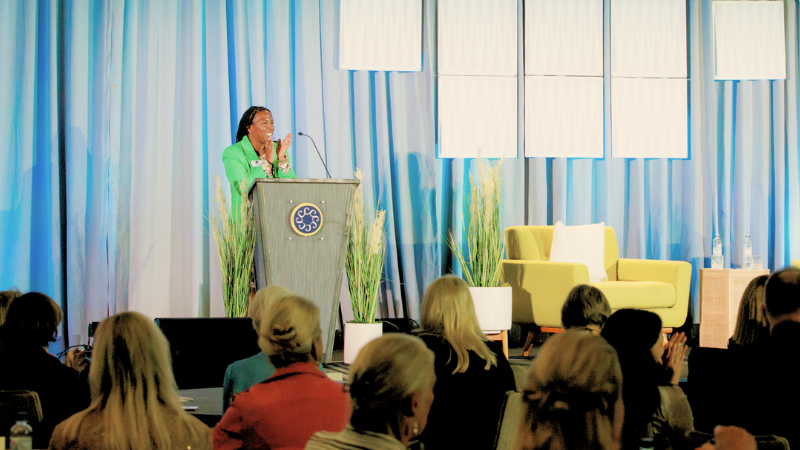
by Eva Glassman | Nov 2, 2023 | Blog, Featured
By Myla Skinner, CEO, C200
Embracing vulnerability and offering support to one another is what enables us as women leaders to thrive in a complicated and often unpredictable professional landscape. Vulnerability, once misinterpreted as a weakness, is now celebrated as a source of strength—allowing today’s leaders to navigate complex business challenges with authenticity and resilience.
In her recent Forbes article, Myla Skinner, C200’s new CEO, shares her perspective; in a world where vulnerability can often be perceived as a liability, female executives are reframing the narrative by recognizing the power of their beautiful soft underbellies as a force to be reckoned with.
You can read the full article here.

by Eva Glassman | Oct 3, 2023 | Blog, Featured
By Sophia Velastegui, Chief Product Officer of Aptiv, C200 Member since 2023.
AI is transforming industries, and corporate boards need to keep pace.
C200 member Sophia Velastegui outlines the strategic imperative of AI for business growth and innovation in this recent Forbes article. Drawing on her experience in launching multiple scaled AI products from tech giants like Microsoft, Google, and Apple, Sophia details real-world AI applications, strategies to overcome challenges, and how boards can empower themselves with AI expertise.
You can read the full article here.

